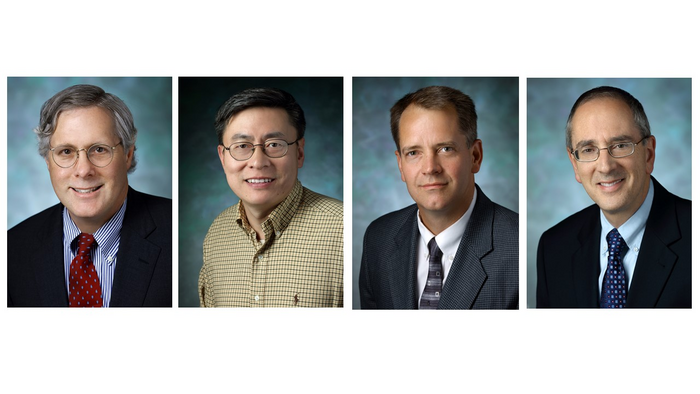Four researchers from the Johns Hopkins University School of Medicine were elected as 2022 fellows of the American Association for the Advancement of Science (AAAS), the world’s largest general scientific society and a publisher of numerous journals, including Science.

Credit: Johns Hopkins Medicine
Four researchers from the Johns Hopkins University School of Medicine were elected as 2022 fellows of the American Association for the Advancement of Science (AAAS), the world’s largest general scientific society and a publisher of numerous journals, including Science.
Gregory Bergey, M.D., Xinzhong Dong, Ph.D., Douglas Robinson, Ph.D., M.Phil., and Antony Rosen, M.B.Ch.B. M.S. , join more than 500 researchers inducted into the 2022 class of fellows. Becoming an AAAS fellow is one of the highest distinctions in the global science community, and it recognizes both achievements in science and scientific integrity.
Gregory Bergey is a professor of neurology, and the director of the Johns Hopkins Epilepsy Center and a co-director of the epilepsy research laboratory at the Johns Hopkins University School of Medicine. After graduating from Princeton University, Bergey attended the University of Pennsylvania’s school of medicine. He then trained in internal medicine at Yale University and neurology at Johns Hopkins, and he performed postdoctoral work in the developmental neurobiology laboratory at the Eunice Kennedy Shriver National Institute of Child Health and Human Development. His research and practice focus on diagnosis and treatment of seizures and epilepsy, including treatment of intractable epilepsy and evaluations for seizure surgery. Bergey’s distinguished contributions to neuroscience include studies of patterns of seizure onset, propagation and cessation, investigations of computer-simulated neural networks and efforts to treat epilepsy with neuromodulation.
Neuroscientist Xinzhong Dong studies the genetic and molecular biology roots of itch and pain. He identified a family of cell surface proteins called G protein coupled receptors on sensory neurons and immune cells — he dubbed the receptors “Mrgprs” and found that they function as itch receptors by detecting numerous itchy substances such as peptides, drugs and lipids. These receptors play important roles in inflammation, bacterial infection and various disease conditions. Dong’s lab is also pursuing research on developing ways to image pain sensation in neurons. Dong is a professor of neuroscience, neurosurgery and dermatology at the Johns Hopkins University School of Medicine and an investigator at the Howard Hughes Medical Institute.
Cell biologist Douglas Robinson studies how cells develop their specialized shapes, and thus, their function, through chemical and mechanical signaling and environmental cues. To study these processes, Robinson starts with Dictyostelium discoideum, a shape-shifting, soil-dwelling amoeba that is often known as slime mold. His lab has used its discoveries about cell shape to identify compounds and strategies that have promise for treating diseases such as pancreatic cancer and chronic obstructive pulmonary disease. Robinson is the founding director of Johns Hopkins’ Summer Academic Research Experience, and Careers in Science and Medicine Initiative, which helps and encourages students from socioeconomically under-resourced backgrounds from fifth grade, high school, and undergraduate and post-baccalaureate levels to enter and thrive in STEM fields. He is a professor of cell biology, pharmacology and molecular sciences, medicine, oncology, and chemical and biomedical engineering at Johns Hopkins.
Antony Rosen is the Mary Betty Stevens Professor of Medicine, a professor of pathology and cell biology, vice dean for research and director of inHealth, the Johns Hopkins precision medicine and individualized health program. He was also the director of the Division of Rheumatology from 2002–2022. Rosen received his medical degree from the University of Cape Town in South Africa in 1984, before pursuing postdoctoral studies in immunology at the Rockefeller University in New York, and residency and fellowship training in rheumatology at Johns Hopkins. His research focuses on autoimmunity in the rheumatic diseases, using subgroups of patients with distinct phenotypes, trajectories and specific autoimmune responses to define molecular mechanisms, particularly those underlying the striking connections between autoimmunity and cancer. He was a Pew Scholar in the biomedical sciences and a Burroughs Wellcome translational research scholar, and he chaired the board of scientific counselors of the National Institute of Arthritis and Musculoskeletal and Skin Diseases. Rosen has been elected to the American Society for Clinical Investigation and the Association of American Physicians.
A full list of awardees can be seen here.




